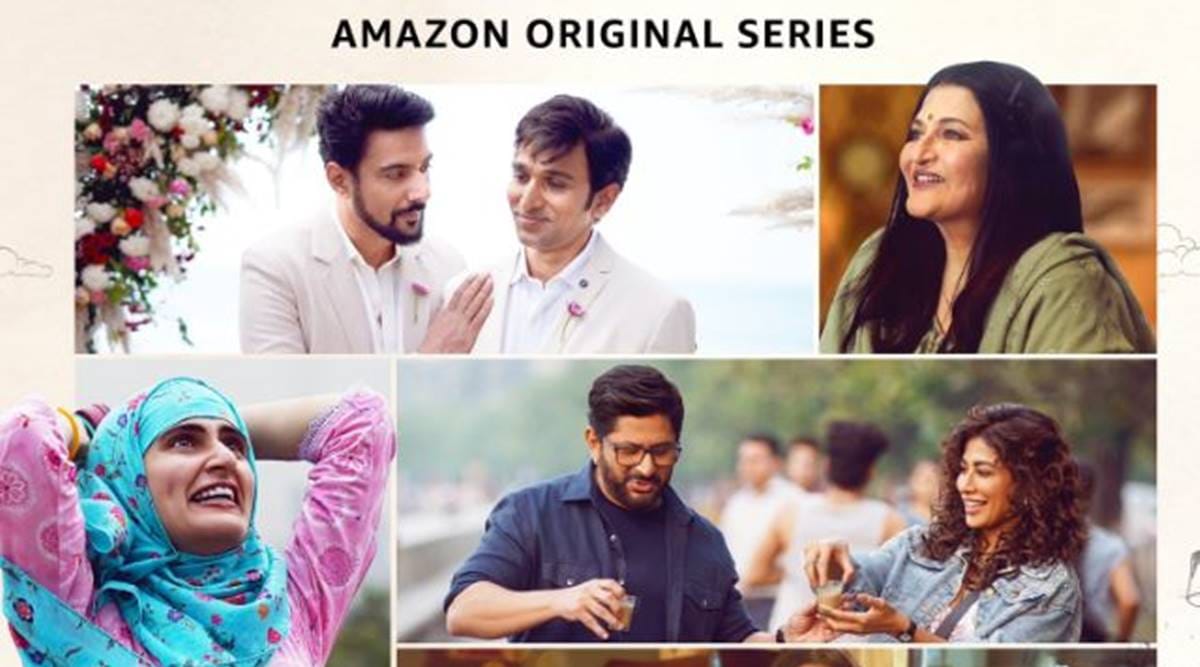 Modern Love Mumbai is streaming on Amazon Prime Video.
Modern Love Mumbai is streaming on Amazon Prime Video. Modern Love Mumbai
Composers: Shankar-Ehsaan-Loy, Vishal Bhardwaj, Ram Sampath, Jeet Ganguly, Gaurav Raina, Nikhil D’Souza, Neel Adhikari
Rating: Two and a half stars
The Mumbai version of Modern Love – John Carney’s American series based on New York Times columns – is a six-part series that has its characters navigating their worlds in the maximum city instead of New York. To support the six stories in the anthology – the makers got six composers into different studios and the result is a seven-track album that could have hit it out of the park. After all, there are names like Vishal Bhardwaj, Shankar-Ehsaan-Loy and Ram Sampath on the list. But barring a couple of tracks, such a vast team – six composers, all of them giants in their specific genres – is unable to pull off brilliance. It does show some flair and talent but doesn’t seem to stem from the recesses of the heart. It does not reach the other side either.
The only songs in the series that make some impact aren’t a part of the album. Baai, Hansal Mehta’s story that merges too much – communal riots, a gay love story and generation gap into a small capsule – comes to life only for a few moments. Pakistani musician Ali Sethi took Majrooh Sultanpuri and Kamal Amrohi’s one line – Chandni raat badi der ke baad aayi hai – from Amrohi’s seminal film, Pakeezah, and wrote another ghazal that merged splendidly with the original. But this and the fabulous C Ramachandra dadra, Lakho ke bol sahe, made extremely popular by Patiala gharana vocalist Nirmala Devi (also actor Govinda’s mother), aren’t a part of the original album.
In the latter, there is a rare outing by Sonu Nigam, who sings a Jeet Ganguly composition here. Kaisi baatein begins quite well with a gentle piano piece and swelling strings finding each other amid Nigam’s start in the low notes. Kyun zamane ke gham uthaate ho, Ishq ko apne kyun gavaate ho, lyrics by Sameer Rahat, make an impact. But as for Ganguly’s melody, it seems like a faux attempt at being delicate. The tenderness of the relationship it is trying to portray, of loss and longing, comes through only sporadically and mostly through the lyrics. Nigam throws his voice gently but with intermittent effect.
Best of Express Premium
One song that did allow itself to be noticed a bit more is Raat bhar, which has been written and composed by Bhardwaj. Interestingly, the Arabic word Hijr (meaning separation), cherished most in ghazal, makes an appearance with more contemporary concepts such as inbox, tweet and text. Startlingly, it is not cringe-worthy at all. The nylon string guitars by Debarpito Saha, along with a tender melody from the typical Bhardwaj arsenal, are both noteworthy. Meiyang Chang sings it in his basic, endearing style. Another piece that works is the title song – Mausam hai pyar, composed and sung by Nikhil D’souza, who sounds absolutely in command.
A surprise comes from London-based tabla player Karsh Kale, who sings for a change, in a bright Neel Adhikari composition titled The Same. Kale is good enough, alright, but the one voice that makes itself heard here is that of22-year0old singer-songwriter Karshni Nair, a phenomenal singer from Pune, who we should look out for in the days to come.
Raat rani, sung by Nikhita Gandhi, comes with energetic arrangements from Sampath. It’s sung well but the composition does not move above being basic (we are mostly used to extremely intelligent music from Sampath) until it reaches a lovely hook. Shankar-Ehsaan-Loy’s Shuru se shuru falls somewhat in the similar category. The tune just doesn’t manage to lift up. It’s even missing the vibrancy of Raat rani.
Yaadein by Gaurav Raina (one half of the folk electronica outfit Midival Punditz) and singer Kamakshi Khanna, is a reminder of the disco of the ’80s. It’s definitely interesting and fresh in a nostalgic sort of way but doesn’t manage to do much for the soul. And that is where most of the album’s issue rests. Listenable tracks that do not stick. My heart goes back to Chandni raat and Lakho ke bol and wants to stay there, outside of this original album.
- The Indian Express website has been rated GREEN for its credibility and trustworthiness by Newsguard, a global service that rates news sources for their journalistic standards.

